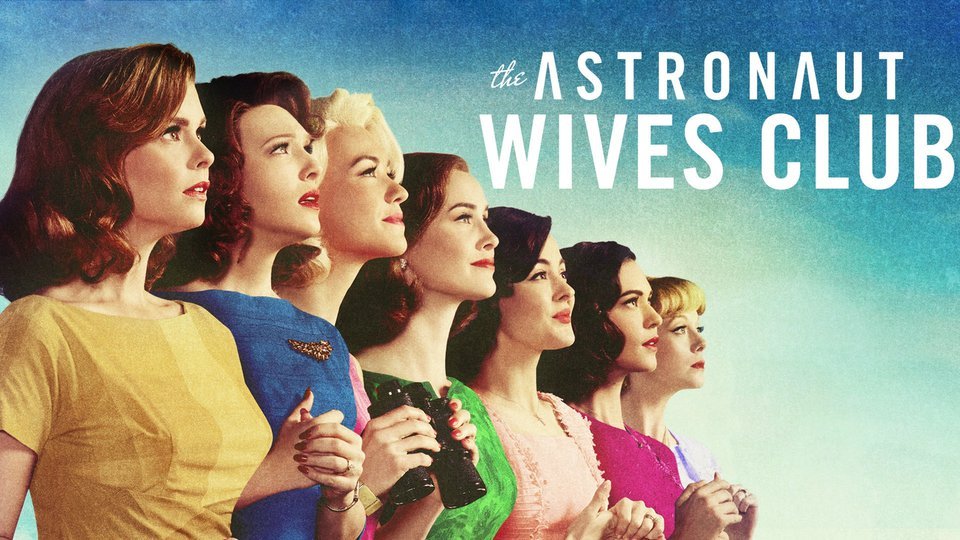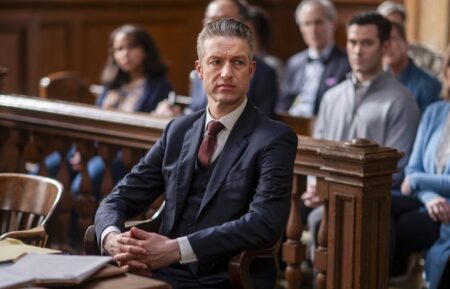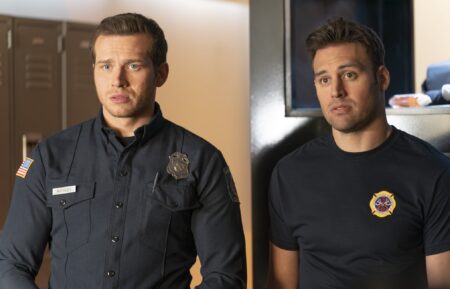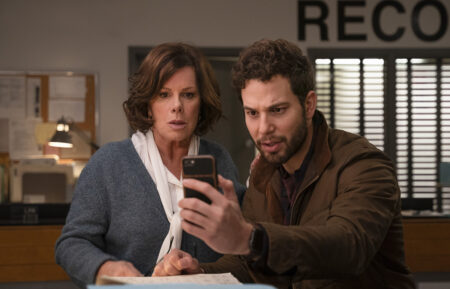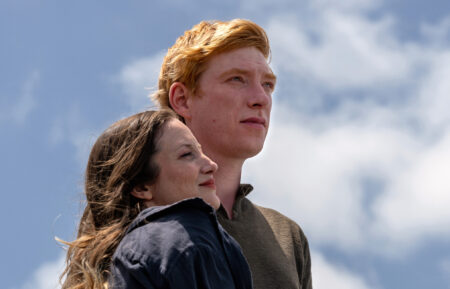‘Astronaut Wives Club’ Finale: How History Shaped the Finale and Whether We’ll See a Season 2
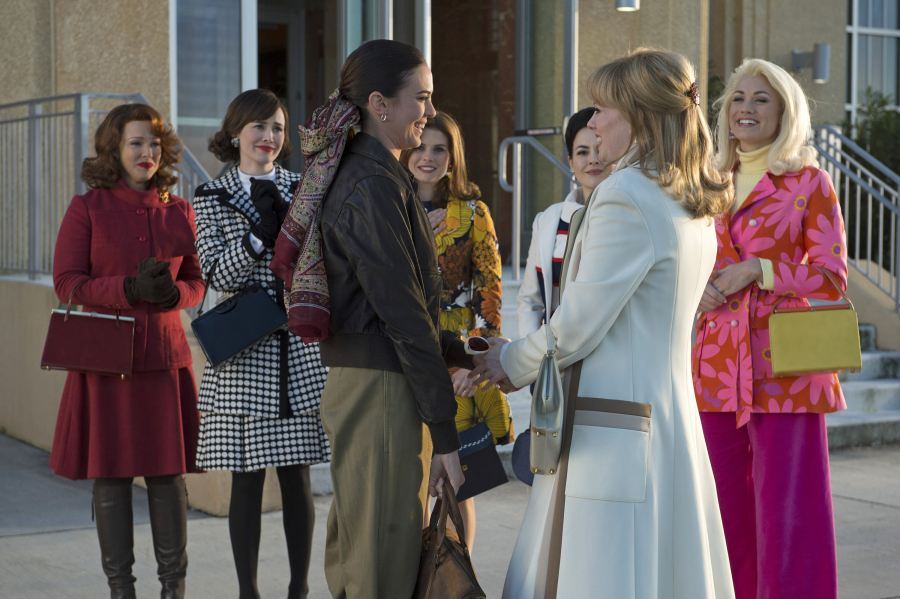
That’s a wrap for The Astronaut Wives Club! The 10-episode historical series about NASA’s space program in the mid-20th century aired its finale Thursday night, showing where all the astro-wives (based on the real women married to the Mercury Seven astronauts and chronicled in the 2013 book from which the show gets its name) and their husbands ended up. We talked to series creator Stephanie Savage (Gossip Girl) about what historical tidbits did and didn’t make it into the final episode and why telling the story of these seven women was her “dream project.”
Why did you decide to open the finale with the documentary takes?
We wanted to bring Max (Luke Kirby) back in the finale and we thought if he was doing something still in the reporting world, [it would have] advanced to doing a documentary. It also felt like a fun trope that gave the opportunity for the women to each speak directly to the camera where they were and to reflect on what this journey has meant to them. And then it became an opportunity for Louise (Dominique McElligott) especially to think deeply on that question, and then of course, we don’t hear her answer until the end of the episode.
Why do you think Max and Louise connected?
Max was a character that we invented for the show because I really wanted someone who talked to Louise and was interested in who she was as a person beyond the perfect housewife. [The real-life Louise] grew up on the DuPont estate. Her father was the engineer that ran all of their fountains. They had a German housekeeper and a big house. She went to boarding school. The DuPonts didn’t have any children so she went to all of their parties and they would bring gifts back for her and her sister from Europe. [Louise] was a sophisticated woman that was sort of thrust into this very military lifestyle and she was educated and well-read. I liked the idea of this LIFE reporter that would see that in her, and give her an opportunity to think about herself in a bigger way than LIFE magazine and NASA was asking her to.
It was really exciting to see Alan Shepard (Desmond Harrington) meet Charles Lindbergh in the finale.
And that’s based on something that really happened! To me, that’s such a beautiful, magical moment. Lindbergh was such a hero to that generation. To be at this launch, standing there, running into this guy, and he knows who Alan is—I really wanted to capture that moment. It’s nice to see Alan a little softer and more boy-ish meeting this person that was inspiring to him.
Were there any other historical figures you wanted to cast in the show that didn’t make it?
In the pilot, I wrote JFK and Jackie as characters [but] we liked using the actual JFK footage, so maybe it was better just to hear about that and not see it. In the end I’m glad we did that; there was so much great footage of JFK and his speeches that we didn’t want to have to use our actor for all of that.
Why did you focus on Zavier’s (Akili McDowell) story and not that of astronaut trainee Ed Dwight (Ray Fisher)?
In the space program, the participation of African Americans was very limited. Florida in that time was very interesting. I got very interested in Cocoa Beach, which started out as a tiny town of 800 people with a large African American population. When John Glenn went to space, the Holiday Inn made him an 800-pound cake that was the same size as an actual capsule. But his launch got pushed like two or three times, so the cake just kept getting more and more wilted and moldy—which would have been really fun to put in the show. But there’s a photo that shows the workers of the Holiday Inn with the cake, and even in the photo, it’s very much segregated with the white workers on one side and the African American workers on the other side. So we talked about wanting to have Antoinette (Dana Gourrier), the housekeeper who would’ve known these families for a decade, and then the idea of giving her a son who’s younger who could really clock the changes that were happening in youth culture at the time. The astro-families were in their own bubble of very traditional society, and not particularly participating in the social change that was going on around them. To have a character that was younger, who was African American, and more involved in the change that was happening, was something that we wanted to do from the beginning of the series.
Were there any challenges to shooting the Moon Ball?
Those days where we have big parties are huge days for background actors. We had literally hundreds of people. Unlike in Gossip Girl episodes, where someone could just come with their hair and makeup done, every single person has to go through complete hair and makeup and wardrobe. We also had to worry about what course is on the table. So when we were shooting the John Glenn (Sam Reid) scene, it was dinner, but [at another table] it was dessert and everything had to be changed and moved. Everyone was bringing 110 percent on that day and I think it turned out beautifully. It was based on a real State dinner that happened after Apollo 11 in Los Angeles.
You’re saying a lot of these things happened in real life—what about Rene’s (Yvonne Strahovski) “to Hell with the pineapple cake” scene, did that actually happen?
Rene is allegedly the first person who showed a diaphragm on television, but it was on her own show, the Everywoman show that you see at the end. We found some episodes of her show too, which are just incredible. Her personality just comes across so completely in terms of her attitude. She just was so curious and embracing of everything that was happening in the world.
Rene’s accent was a little jarring to people who’ve seen Strahovski in other shows.
All the actresses wanted to find footage where their wives were speaking so they could hear what their voices were like too, but really Annie and Rene were the only ones that we could find talking.
Why do you think it was important to tell these women’s stories?
When I read [Lily Koppel’s book] I just fell in love with them. So often women’s stories are not recorded as a part of history, and then women don’t become a part of history. So now, when we’re having the 50th anniversary of the moon landing, I want there to be a chapter about the wives. I want people to know who these women were and tell their stories alongside the other stories. I also want to know why it took 23 years for Sally Ride to get into space.
Do you have a favorite wife out of the original seven?
I don’t think I have a favorite. I think in order to write a character you have to find yourself in them, and that was really challenging for this project because there were seven wives. But they are all so different and amazing. Honestly, I think it’s extraordinary that you’re trying to find seven cookie cutter women that are trying to fit the mold of the perfect housewife and every single one of them is completely not that. Which makes you wonder if that woman even really exists. I hunted for her really hard and I didn’t find her so, maybe she just exists in our imagination.
Is there going to be a Season 2?
To us on the creative side, it’s always been a miniseries with a beginning, middle and end, with no possibility of a Season 2 because we told the story. I love that a lot of people love the characters and the world, but I don’t really see how this story gets told over again.

